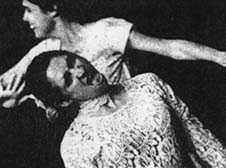
Profiles & Interviews • Press
- Vulture March 19, 2020
- The Times of London May 10, 2012
- The New York Times December 16, 2010
- The New Yorker September 27, 2010
- ArtForum: Best of 2007 December 2007
- The Point Magazine Spring 2009
- The New York Times Magazine December 9, 2007
- TheatreForum Issue 23
- TheatreForum Issue 23
- Women and Performance: A Journal of Feminist Theory Issue 24
- Women and Performance: A Journal of Feminist Theory Issue 24
- The Village Voice May 28, 2002
- Bomb Spring 1999
- The Village Voice May 26, 1998
- New York Magazine "Best of New York" issue May 4, 1998
- American Theatre September 1997
- Paper December 1994
Going Up
Elevator Repair Service Shakes the House
by Margot Ebling
John Collins cannot live with tidy endings. “I’ve got to shake things up somehow or I’m gonna go crazy,” he mutters, faced with a logical scene conclusion. I wonder what “going crazy” would entail for the soft-spoken artistic director of Elevator Repair Service — a hot and rising experimental theater company — and am faced with the image of a techie gone haywire. Sporting spectacles and a wash of faded gray at a recent rehearsal, Collins resembles a Dead Poets Society member who had tapped into the institution’s central nervous system and now has his hands on all the right buttons. Still wired from their European tour, ERS is busily polishing their work in progress, Cab Legs, for a second run at P.S. 122 starting September 11, but don’t expect the kind of varnish that spells “finished coat.”
“Sometimes I’ll start out with just an image of what I want the play to feel like,” Collins explains, “like this is going to be fast and dark, or this is more steep and satirical. Anyone from the company can come in with ideas that we an attack. It’s about finding out what results come from putting ourselves in the room with this material. We get to a point where we decide we have our rough draft. After that, we’ll say, ‘Okay, there’s a show in there — go in and find it!'” Collins’s wry stare makes me jump twice: first, to check under my seat to see what’s been planted there, and second to conclude the ERS’s play-making bubbles from a well of self-mockery. A blend of ingenuity and goofiness inspires this 12-member company, now in its sixth seaon, to whimsical distraction. While they aren’t afraid to look silly (check out their cartoon dances), they approach such silliness with fine-tuned sophistication. “There’s a certain kind of self-awareness that we can’t stand,” Collins admits. “It’s part of our collective personality, but I think it’s a good thing to fight. One inspiration for Cab Legs is the idea of making everything really real, that no one onstage could speak any louder than they need to to be heard by the person they were talking to. A bunch of us saw a show at La MaMa, something that had been thrown together quickly. All through the show, actors were forgetting their lines. Several times someone would pause and someone else onstage would feed them the lines, like this [he grits his teeth ventriloquist-style], and I found that thrilling. All of a sudden, what was going on underneath this cheesy play was startlingly real. This struck us as a challenge. It’s very easy to be large and theatrical — and ironic and funny in that way. But to achieve the same thing with some kind of sincerity seemed much more interesting to us.”
If sincerity is a challenge, try wiggling your knees. Inspired by the rubber-limbed flips of Max Fleischer cartoons and the spasmodic gyrations of an Indian film star, the group set about incorporating dance into a traditional love story for Cab Legs. “We want a kind of impossible task,” Collins says. “We were watching these dances being done by cartoons, by people with no real joints in their legs. And the clashing of those two things — the dancer’s real body and this bizarre ideal — created a lot of fun dancing. We’re looking for things that aren’t appropriate for the stage. It’s not the inappropriateness that interests us, but what’s going to come out of trying to get those things to come together that don’t belong together. Something theatrical will come out of it, but it contains this mysterious struggle.
Waggling her hands and swishing her hips, Katherine Profeta appears a happy victim of the struggle as she demonstrates a dance move. “Is it too cute?” she asks Steve Bodow, a fellow Repairman. Bodow, hand on the soundboard and eyes on the groove, does not flinch: “We’ll find a way to muck it up.”